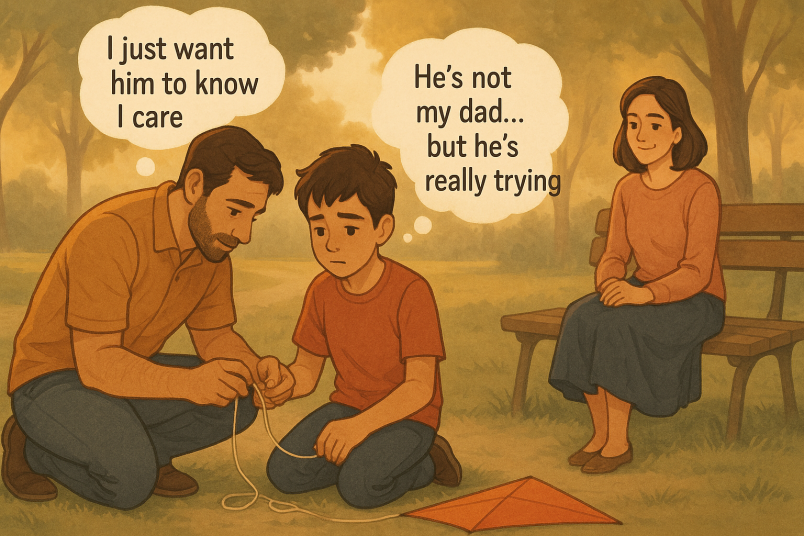How to Be a Great Stepdad: 13 Tips

Heal & Grow Daily for a Happier Relationship
Subscribe FREETable of Contents
Table of Contents
Key Takeaways
Marriage.com AI Quick Summary
“Hey, buddy… mind if I join you?” You ask gently, as your partner’s child hesitates before nodding. Becoming a stepdad isn’t about instantly filling someone else’s shoes—it’s about walking beside them, one careful step at a time.
There will be moments of silence, smiles that take time to earn, and small wins that mean everything. Learning how to be a great stepdad often begins not with grand gestures, but with patience, kindness, and the willingness to show up—consistently, quietly, and with genuine care.
Over time, those small steps can build something beautifully steady… a new kind of family.
What does ‘step’ mean in stepdad?
Stepparents are individuals who voluntarily assume the parental role, whether due to divorce, death, or other circumstances. While step-parenting now encompasses diverse situations, the legal definition remains precise.
A research paper published in 2023 states that a step-parent is someone who becomes a parent figure by marrying or partnering with one of the child’s biological parents.
Example: Jake, who marries a single mother and gradually becomes a steady figure in her child’s life—not by replacing the father, but by offering support, laughter, and consistency that help the child feel safe again.
Please note:
If you’re learning how to be a great stepdad, remember—there’s no perfect formula. What matters most is your patience, willingness to listen, and the genuine care you bring into your stepchild’s world.
5 common challenges stepdads face
Blending into a family as a stepdad can be both rewarding and challenging. It takes time, patience, and understanding to build trust while finding your place in a child’s life.
[research_highlight content=’A research paper published in the National Library of Medicine states that strong, positive stepfather–child relationships improves emotional well-being, adjustment, and family stability in blended households.‘][/research_highlight]
From learning boundaries to handling emotions, here are five common challenges stepdads face—and how to approach them with empathy and confidence.
1. Building trust with your stepchild
One of the biggest challenges is earning your stepchild’s trust. They may still be processing past changes, like their parents’ separation, or unsure about your role in their life. Trust isn’t built overnight—it grows through small, consistent actions that show reliability and respect.
- How to overcome: Be patient. Show up when you say you will, listen more than you talk, and let them take the lead in bonding.
2. Defining your role in the family
It’s common to feel uncertain about where you fit in—are you a friend, mentor, or father figure? Every family is different, and forcing a label too soon can create tension. Focus on understanding the household dynamic first before setting boundaries or taking authority.
- How to overcome: Communicate openly with your partner about expectations, and agree on what feels right for everyone involved.
3. Co-parenting with the biological parent
Navigating co-parenting can be tricky, especially if the biological parent is still involved. Miscommunication or jealousy can easily lead to conflict. The key is maintaining mutual respect and focusing on what’s best for the child, not personal differences.
- How to overcome: Keep communication polite and professional. Avoid taking sides or criticizing the other parent in front of the child.
4. Managing discipline fairly
Discipline is a sensitive area. Stepchildren might not respond well to rules coming from someone new, especially if they feel you’re overstepping. It’s best to let your partner take the lead initially while you support their approach. Gradually, you can step in as trust grows.
- How to overcome: Discuss household rules with your partner privately so you both stay consistent and united in front of the kids.
5. Balancing your relationship and parenting
It’s easy to get caught between nurturing your relationship with your partner and bonding with the kids. Sometimes, one can feel neglected. Striking a balance helps everyone feel valued and keeps the home environment stable and loving.
- How to overcome: Schedule time for both—date nights with your partner and separate one-on-one moments with the kids. Consistency keeps connections strong.
Please note:
Learning how to be a stepdad means accepting that the process takes time and grace. Whether you’re figuring out how to be a good stepdad or wondering how to be a better stepdad, remember—progress is found in patience, honesty, and showing up every day with love and understanding.
How to be a great stepdad: 13 tips
Being a stepdad is a journey of patience, love, and steady effort. It’s not about replacing anyone—it’s about showing up with care and consistency. Learning how to be a good stepdad means embracing small moments that build trust, warmth, and a lasting bond over time.
1. Set aside your fantasies and expectations
It’s normal to go into a new marriage with great expectations and hopes of having a close and loving relationship with your new stepkids. You may be willing to give it everything you’ve got and that is great.
- What the child may think: Building a relationship with you may be way more complicated than you imagined. For them, it may feel as if they are being disloyal to their biological dad if they become close to you.
- What you can do: Think about how you can meet your stepchild where they are at, without expectations or unrealistic fantasies, and slowly develop a friendship that is different from a father/child relationship.
2. Be available and approachable
Becoming a stepdad is basically being there for the children. It’s a huge adjustment for all concerned when two families blend, so if you as the stepdad are defensive and easily offended it is going to be that much more difficult for you and the kids.
- What the child may think: They may test of your character and once you have passed the test you will most likely have gained a strong and worthwhile relationship with your stepkids.
- What you can do: If you are available and approachable, even after they have reacted badly, you will begin to gain their trust. They will see that your love and care are dependable, even in the face of their other losses.
3. Be careful and aware of the discipline minefield
You may have thought that you could implement all your ideas about discipline, and that part of your role as stepdad would be as the disciplinarian of the family.
- What the child may think: Discipline is probably one of the trickiest areas of your relationship with your stepkids and there will no doubt be some hidden landmines for you to navigate.
- What you can do: It is necessary to build a level of loving care and trust with the children before you can be actively involved in their discipline.
4. Openly express your role and commitment
‘How to be a good stepfather?’ By being committed to your new role. It is also good to make it clear to your stepkids that you do not want or intend to try and take the place of their biological dad.
- What the child may think: Most stepchildren have a fantasy that their parents will get back together one day, so your presence as the stepdad may be seen as an obstacle.
- What you can do: With patience and perseverance on your part, you can tell and show them that your commitment to their mother is a lifelong one.
5. Manage your own stress
Remember that your stepkids are trying to determine whether loving and trusting you is worth the risk. They will inevitably push your buttons to see what happens.
- What the child may think: They may find it much more difficult to forgive a stepparent than their biological parents, regardless of the extenuating circumstances.
- What you can do: So when conflict arises and you become stressed it is imperative that you manage your emotions without overreacting towards the children or their mother.
6. Don’t take things personally
Never make it about the ‘stepdad vs biological dad’ debate. This could easily escalate to become one of the signs of a bad stepfather.
It is very rare to find a child who is mature enough to take in their stride all the complex feelings that arise as a result of being in a stepfamily.
- What the child may think: Your marriage to their mother may seem like the death knell for their hopes of their parents ever getting back together again. Then there is the loyalty bind where kids can feel that they are being disloyal to their biological father if they get along well with their stepdad.
- What you can do: Don’t take things personally and try to reach a place where you can have a non-threatening talk with your stepkids and let them tell you how they really feel.
7. Lead by example
The best way to be a leader worthy of being followed by your stepkids is to set a good example in your life. As you consistently behave with integrity and reach out to them in thoughtful and loving ways, they will learn what kind of character you have.
- What the child may think: “He really means what he says.” When stepchildren see you keeping promises, handling challenges calmly, and treating their parent with respect, they start to believe your actions—and slowly, trust follows.
- What you can do: You can work with their mother to set a good tone in your home where the children feel secure, with firm boundaries, expectations, and values. Show your stepchildren that you are a person who is worthy of respect, and eventually, they will give you the respect you deserve.
8. Respect their bond with their biological parent
It’s vital to understand that your stepchildren’s relationship with their biological father is important and shouldn’t be threatened. Trying to compete or replace him can create resentment or emotional distance.
- What the child may think: “I don’t want to lose my dad.” They might worry that liking you means betraying their biological parent, which can make them pull away or act out.
- What you can do: Encourage their connection with their dad. It shows emotional maturity and earns you respect for not trying to take his place. That’s a big part of how to be a great stepdad.
9. Build a relationship at their pace
Every child adjusts differently to a new family structure. Forcing closeness can make things awkward or uncomfortable. Relationships grow naturally through shared moments—not pressure.
- What the child may think: “I need time.” They might still be processing the family changes and may not be ready to open up or call you “Dad.”
- What you can do: Let them come to you when they’re ready. A simple game, shared meal, or car ride conversation can mean more than forced bonding.
10. Communicate openly with your partner
Healthy step-parenting starts with teamwork. Misunderstandings about rules, discipline, or boundaries can cause confusion for the kids. You and your partner need to stay united and consistent.
- What the child may think: “They’re on the same team.” Kids feel more secure when both adults agree and communicate calmly instead of arguing or giving mixed signals.
- What you can do: Discuss parenting decisions privately. Present a united front, so your home feels structured and safe for everyone.
11. Show appreciation for small steps
When your stepchild makes an effort—like joining you for dinner or asking for help—acknowledge it. Small gestures matter and help build connection slowly but surely.
- What the child may think: “He noticed that.” Feeling seen and appreciated encourages them to keep engaging and trust you more.
- What you can do: Praise gently and genuinely. A simple “Thanks for joining me” goes a long way in showing warmth and gratitude. That’s part of how to be a better stepdad.
Watch this TED Talk by Becky Kennedy, a clinical psychologist, who shares how repairing relationships with children builds trust and emotional resilience.
12. Include them in family decisions
Stepchildren may sometimes feel left out or powerless in blended families. Giving them a voice in simple choices—like weekend plans or family meals—can make them feel valued.
- What the child may think: “My opinion matters here.” It helps reduce resentment and strengthens their sense of belonging.
- What you can do: Involve them in family talks and decisions suited to their age. It teaches teamwork and shows respect for their perspective.
13. Celebrate individuality and differences
Each child has their own personality, likes, and dislikes. Trying to mold them into what you think they should be can harm trust. Instead, embrace their uniqueness.
- What the child may think: “He likes me for who I am.” Acceptance helps them relax and connect more openly.
- What you can do: Support their hobbies, be curious about their interests, and show genuine enthusiasm. That’s the heart of how to be a good stepdad—loving them for exactly who they are while learning how to be a stepdad with patience and grace.
FAQ
Stepping into a blended family brings unique questions and challenges. Here are a few common concerns of how to be a great stepdad, answered simply and honestly to help you navigate this special role with confidence and care.
-
How long does it take to bond with stepchildren?
Every relationship grows differently—it may take months or even years. What matters most is consistency, patience, and showing genuine care without forcing closeness.
-
Should I discipline my stepchildren?
Not right away. Let your partner handle discipline initially while you focus on building trust. Once you’ve formed a connection, set boundaries together as a team.
-
How can I make my stepchild feel comfortable with me?
Start small—listen, share light moments, and show respect for their feelings and space. Authentic kindness and steady presence go a long way.
Building lasting bonds
How to be a great stepdad isn’t about perfection—it’s about patience, presence, and love shown through everyday actions. You may not share DNA, but you can share laughter, trust, and stability that shape a child’s world.
Blended families take time to grow, but with understanding and compassion, you’ll create meaningful connections that last.
Remember, learning how to be a stepdad isn’t a single moment—it’s a journey built on respect, care, and the quiet strength of showing up, day after day.
Share this article on
Related Quizzes
Heal & Grow Daily for a Happier, Healthier Relationship
Subscribe FREE on YouTube We'd love your feedback!
We'd love your feedback!
 Expert Q&A
Expert Q&A
Ask your question related to this topic & get the support you deserve from experts.


 Reviewed by
Reviewed by











 Thanks for your feedback!
Thanks for your feedback!